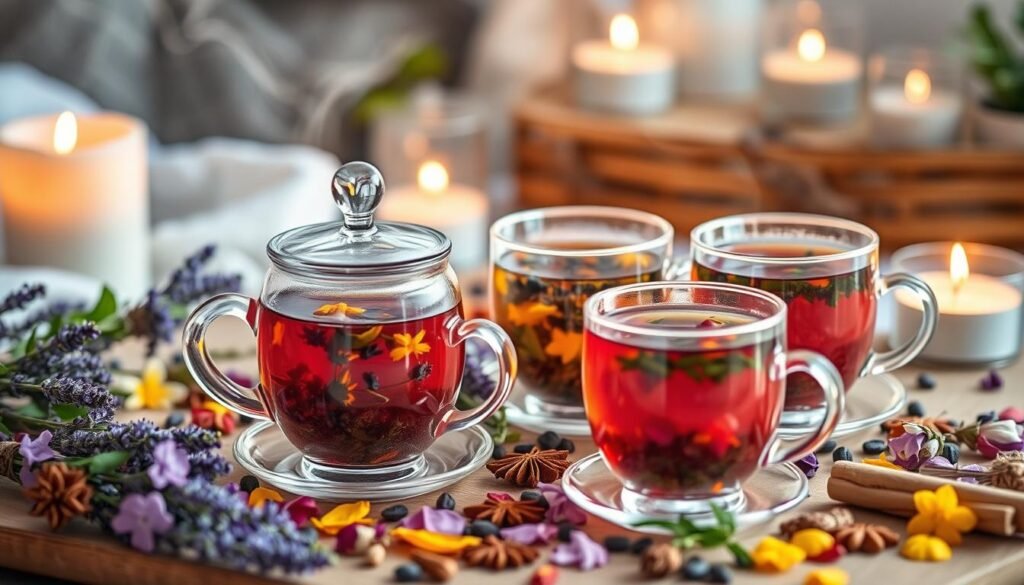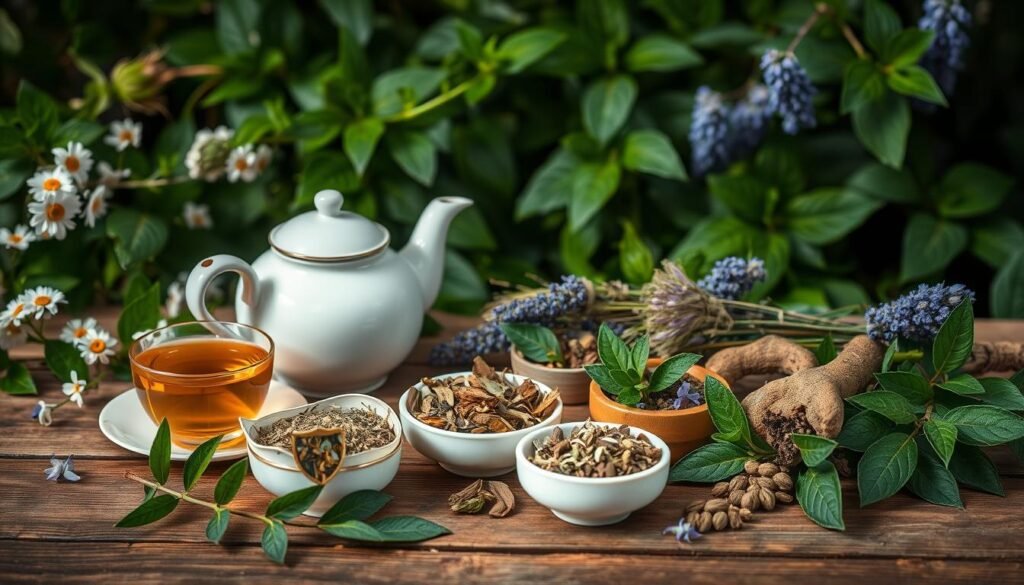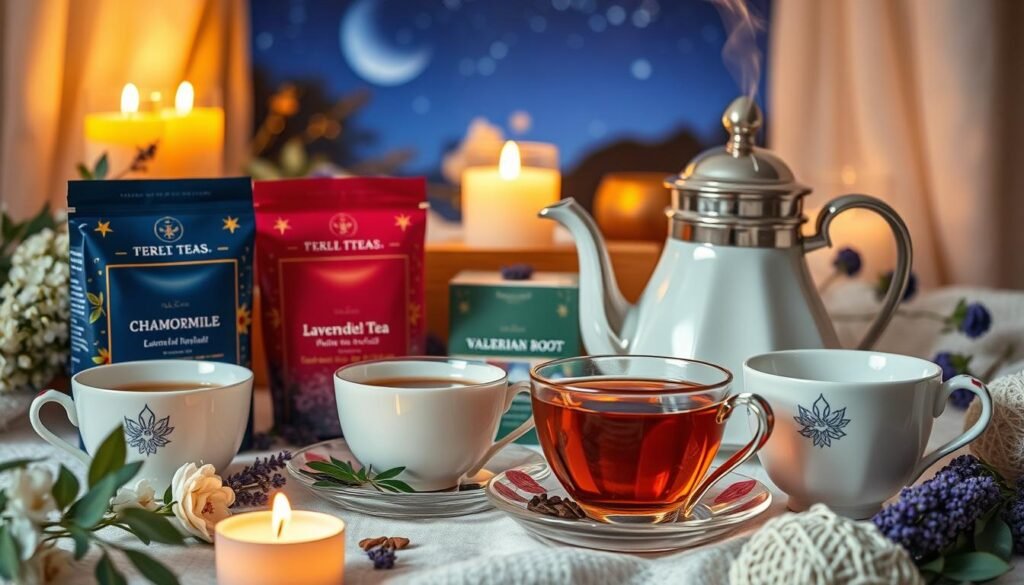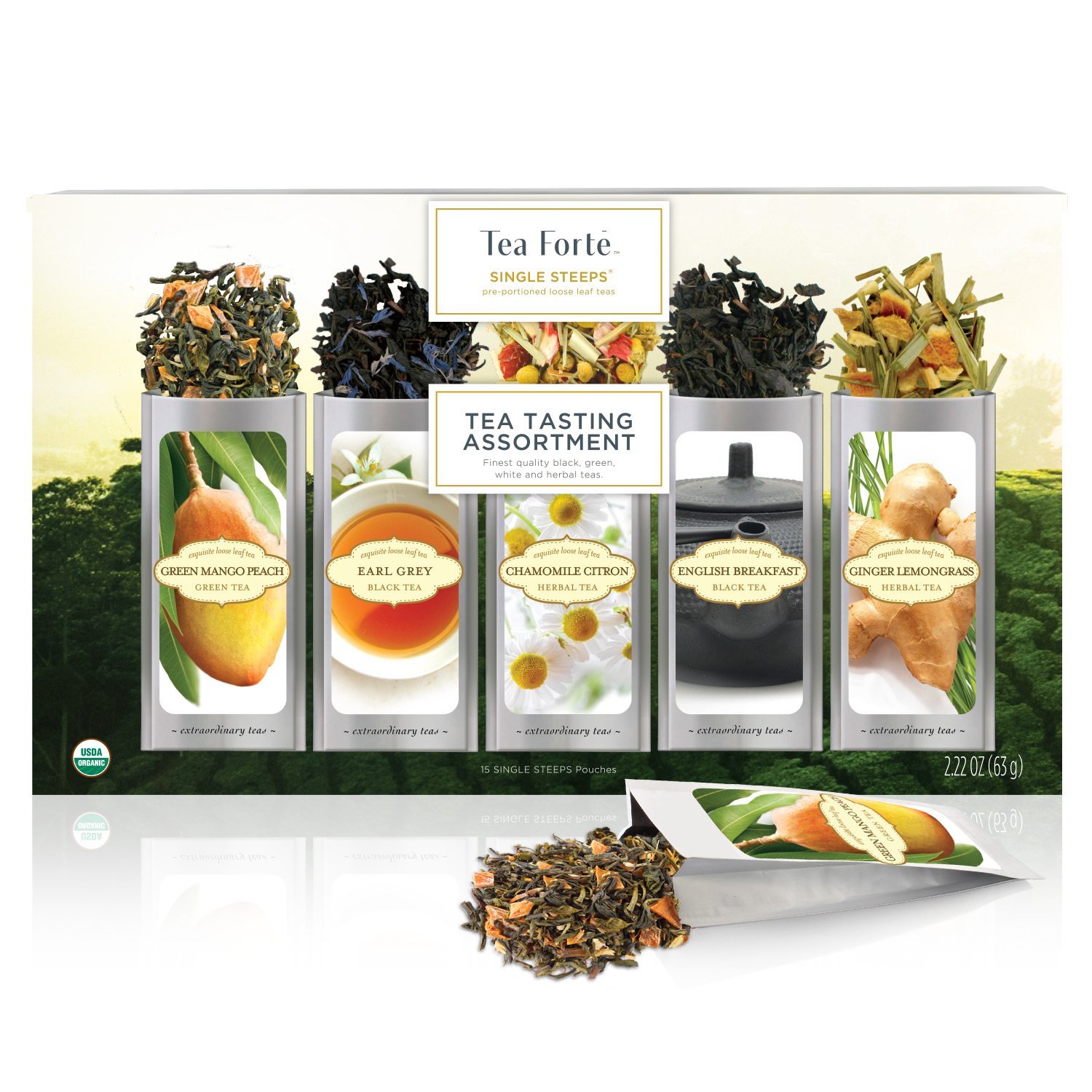Late nights and restless sleep are common. You might find yourself tossing and turning, watching the clock. It’s not just you; many people face this.
Herbal teas are a gentle, soothing option for sleep. They offer a natural way to relax and improve sleep quality. Traditional Chinese medicine has long used them for this purpose.
Looking for the best sleep teas is more than finding a tasty drink. It’s about finding a way to calm down at night. This can change your bedtime routine and help your overall health.
Key Takeaways
- Herbal teas offer natural solutions for sleep challenges
- Scientific research supports the sleep-inducing properties of certain teas
- Different teas target various aspects of sleep and relaxation
- Individual responses to sleep teas can vary
- Consulting healthcare providers is recommended for persistent sleep issues
Understanding Sleep Teas and Their Benefits
Sleep teas are a natural way to relax and improve sleep. They use herbal ingredients that work with your body’s natural sleep cycles. This makes them a gentle solution for better rest.
Research shows how sleep teas interact with our bodies. It’s amazing how certain herbs can affect our sleep and recovery. This connection is key to understanding their benefits.
How Sleep Teas Interact with Your Body
Sleep teas interact with our bodies in several ways:
- They activate calming neurotransmitters like GABA
- They help reduce anxiety and stress
- They promote muscle relaxation
- They support our natural sleep cycles
Key Natural Compounds in Sleep Teas
| Compound | Source | Sleep Benefits |
|---|---|---|
| Apigenin | Chamomile | Mild sedative effect |
| Magnesium | Rooibos Tea | Muscle relaxation |
| Flavonoids | Multiple Herbs | Nervous system support |
The Science Behind Tea and Sleep Quality
Studies show the benefits of sleep teas. A 2017 study found that 60 nursing home residents slept better after drinking chamomile extract. In 2016, a study showed that chamomile tea helped postpartum women sleep better.
“Natural remedies like sleep teas offer a gentle approach to improving rest without the side effects of pharmaceutical interventions.”
Learning about these interactions helps you pick the best sleep tea. It supports your nightly relaxation and overall health.
Best Sleep Teas for Relaxation, Good Night Sleep
Discovering the right sleep tea can change your bedtime routine. It helps you get a good night sleep. With so many choices, finding the best sleep teas for relaxation is now easier.
Let’s look at some top sleep tea blends for relaxation and better sleep:
- Pukka Night Time Blissful Rest: A blend made to help you relax deeply
- Yogi Bedtime Tea: An Ayurvedic mix to reduce stress
- Celestial Seasonings Sleepytime: A favorite herbal tea for many
Chamomile tea is a strong natural sleep aid. Studies show it can cut insomnia by up to 80% in regular drinkers. This herb calms your nervous system and gets your body ready for sleep.
“The right tea can be a natural gateway to peaceful, restorative sleep.” – Sleep Wellness Expert
When picking your sleep tea, think about these things:
- Ingredient quality
- Herbal mix
- What you like to drink
- How it helps you relax
The sleep tea market has grown 15% in a year. This shows more people want natural sleep help. You can find everything from classic chamomile to complex herbal mixes to meet your relaxation needs.
Essential Ingredients in Effective Sleep Teas
Discovering the right mix of herbs can change your bedtime routine for the better. Sleep teas are special blends that use natural ingredients to help you relax and sleep well.
Primary Relaxation Herbs
The heart of good sleep teas is in strong relaxation herbs. These have been used for ages. Key ingredients include:
- Chamomile tea: Reduces sleep barriers and depressive symptoms
- Valerian root tea: Helps nearly 90% of people improve their sleep
- Lavender tea: Decreases fatigue and supports relaxation
- Passionflower tea: Enhances overall sleep quality
Supporting Botanical Elements
There are also other botanical elements that make sleep teas work better:
| Botanical Element | Sleep Benefits |
|---|---|
| Lemon Balm | Reduces insomnia symptoms |
| Holy Basil | Supports stress reduction |
| Magnolia Bark | Reduces time to fall asleep |
Flavor-Enhancing Components
Manufacturers add ingredients that make sleep teas taste good. These ingredients also have health benefits:
- Mint for refreshing flavor
- Licorice for natural sweetness
- Fruit extracts for subtle taste variations
“A perfect sleep tea is a delicate balance of therapeutic herbs and delightful flavors.” – Herbal Tea Expert
Knowing about these ingredients helps you pick a sleep tea that tastes great and helps you sleep well. Each herb has its own role in helping you get good sleep.
Chamomile and Lavender: The Classic Sleep-Inducing Duo
For thousands of years, people have used chamomile and lavender to sleep better. These teas are known for their ability to calm the mind and body. They offer a gentle way to find peace and relaxation.
These herbs have a long history in traditional medicine. In fact, 40% of Western medicines come from plants. This shows how powerful natural remedies like chamomile and lavender can be.
“Nature’s pharmacy offers some of the most effective sleep solutions,” says traditional herbal experts.
Let’s look at what makes these herbs special:
- Chamomile has apigenin, a flavonoid that helps reduce anxiety
- Lavender’s scent can lower heart rate and blood pressure
- Together, they help you sleep deeper and more restfully
Here are some tips for making your stress-relieving teas:
| Herb | Steeping Time | Best Preparation |
|---|---|---|
| Chamomile | 4-5 minutes | Hot water, cover while steeping |
| Lavender | 3-4 minutes | Blend with chamomile for enhanced effect |
Chamomile and lavender have been used for centuries. They are backed by science and remain the best natural way to sleep well.
Valerian Root and Passionflower Blends
Discovering natural sleep remedies can change your bedtime routine. Valerian root tea and passionflower tea are strong options for sleep issues.
Benefits of Valerian Root
Valerian root is a top choice for sleep. It boosts GABA, making you feel tired and relaxed.
- Increases GABA production
- Reduces anxiety
- Supports nervous system health
- Used for thousands of years
Passionflower’s Calming Effects
Passionflower tea is great for calmness. It helps quiet your mind and body for sleep.
“Nature’s tranquility in a cup” – Herbal Medicine Practitioners
Optimal Brewing Methods
Getting the right valerian root and passionflower tea is key. The water temperature and steeping time matter a lot.
| Herb | Water Temperature | Steeping Time |
|---|---|---|
| Valerian Root | 205°F | 7-10 minutes |
| Passionflower | 190°F | 5-7 minutes |
Together, these herbs make a strong sleep remedy. They can help you sleep better. Always talk to a doctor before trying new herbs.
Innovative Sleep Tea Combinations
Explore the world of relaxing herbal tea blends that go beyond traditional sleep remedies. Modern tea crafters are developing unique combinations to address specific sleep challenges and taste preferences.

Innovative sleep tea blends are changing how we relax at night. Tea makers are mixing powerful plants to help us sleep better.
- Lemon balm tea offers gentle calming properties
- Peppermint tea provides digestive support
- Magnolia bark tea helps reduce anxiety
New sleep tea mixes use science to relax us. They aim to improve sleep quality by tackling stress and promoting deep rest.
| Tea Blend | Key Ingredients | Primary Benefits |
|---|---|---|
| Calm Night Blend | Lemon balm, chamomile, lavender | Stress reduction, improved sleep onset |
| Zen Evening Mix | Magnolia bark, passionflower | Anxiety relief, mental relaxation |
| Minty Tranquility | Peppermint, valerian root | Digestive comfort, muscle relaxation |
Discover a world where tea becomes your natural pathway to restful nights.
When picking your sleep tea, think about what you need. Relaxing herbal tea blends now offer specific solutions for sleep issues.
How to Prepare Your Sleep Tea for Maximum Effect
Making the perfect calming bedtime drink is more than just adding a tea bag to hot water. Your herbal teas need careful preparation to work their best for stress relief.
Ideal Brewing Temperature
The water temperature greatly affects your herbal tea’s strength. Each ingredient needs a specific temperature to release its best benefits:
- Chamomile: 200°F (93°C) for 5-7 minutes
- Lavender: 190-200°F (88-93°C) for 3-5 minutes
- Valerian root: Slightly cooler at 185°F (85°C) for 7-10 minutes
Timing Your Evening Tea
Drinking your tea at the right time can improve your sleep. Studies show that drinking one to two hours before bed is best. This lets your body absorb the tea without interrupting your sleep.
| Tea Type | Recommended Consumption Time | Expected Effect |
|---|---|---|
| Chamomile | 90 minutes before bed | Mild sedation |
| Passionflower | 60 minutes before bed | Anxiety reduction |
| Valerian Root | 2 hours before bed | Deep relaxation |
Creating a Relaxing Tea Ritual
Make your tea-making a mindful moment. Choose a quiet spot, use your favorite mug, and breathe deeply while it steeps. This signals to your body that it’s time to relax.
“The art of tea is a spiritual practice that transforms ordinary moments into peaceful transitions.” – Unknown
By following these steps, you’ll get the most out of your calming bedtime drinks. You’ll create a peaceful way to sleep.
Safety Considerations and Possible Side Effects

Looking into natural sleep remedies? It’s key to know about possible side effects and safety tips. Sleep teas can offer big benefits, but not all are good for everyone.
Before adding holy basil tea or other herbal blends to your sleep routine, follow these safety tips:
- Always talk to your doctor before trying new herbal supplements
- Watch out for any interactions with your current medicines
- Make sure you’re not allergic to any herbs in the tea
Some groups need to be extra careful with sleep teas:
- Pregnant or breastfeeding women should avoid most herbal sleep teas
- Children under 3 should not take herbal sleep supplements
- People with liver disease need to be very careful
“Not all natural remedies are safe for everyone” – Sleep Health Research Institute
The National Center for Complementary and Integrative Health says to carefully check herbal supplements. For example, valerian root is usually safe for adults for about 28 days.
| Herb | Safety Considerations | Potential Side Effects |
|---|---|---|
| Valerian Root | Short-term use recommended | Headaches, dizziness, stomach issues |
| Holy Basil | Generally safe for most adults | Mild digestive discomfort |
| Chamomile | Low risk for most people | Potential allergic reactions |
Important note: Herbal supplements aren’t strictly watched by the FDA. This means the ingredients can vary. Always buy from trusted sources and start with small amounts to see how you react.
Incorporating Sleep Teas Into Your Bedtime Routine
Adding herbal teas to your bedtime routine can change your evening. It turns your nightly ritual into a key for better sleep and less stress.
To include stress-relieving teas in your evening, plan carefully. Experts say to drink calming teas one to two hours before bed. This helps avoid midnight trips to the bathroom.
- Choose caffeine-free herbal blends
- Prepare tea in a peaceful environment
- Use consistent brewing techniques
- Create a relaxing pre-sleep atmosphere
“The ritual of tea preparation can be as soothing as the tea itself” – Sleep Wellness Institute
Studies show herbal tea has big benefits. A study found 48% of people slept better after drinking herbal tea regularly. White tea, with little caffeine, is a great choice for the evening.
| Tea Type | Caffeine Content | Sleep Benefits |
|---|---|---|
| White Tea | Lowest | High antioxidants |
| Chamomile | None | Improves sleep quality |
| Lavender | None | Reduces anxiety |
Keep in mind, everyone reacts differently. Try different herbal teas to find the one that helps you sleep best.
Conclusion
Finding the best sleep teas can change your bedtime routine and boost your health. Studies show tea drinkers can sleep up to 30% better. This makes these teas great for improving sleep.
Getting better sleep is easy with natural remedies like chamomile and valerian root. These teas help your body relax and sleep better. Over 59% of stressed workers feel better after using these teas.
Finding the right sleep tea is a personal journey. Different teas work for different people. So, try different ones and talk to a doctor to find what works best for you.
Adding sleep teas to your bedtime routine can greatly improve your health. Let these natural drinks help you find a peaceful sleep.






Hello, Neat post. There is an issue with your website in Internet Explorer. Could you test this? IE still is the marketplace leader, and a large component of other people will omit your magnificent writing because of this problem.